We want to get to Phnom Samkos in the Cardamom mountains. Forgotten during the years of civil war and isolated by their remoteness and rugged terrain, this region is considered one of the last remaining patches of significantly unexplored forest in Indochina. Home to sun bears, gibbons, cobras and hornbills, there are even a few wild tigers, clouded leopards, Siamese crocodiles and elephants clinging on to life here.
The man who seems to be able to make a trip into the jungle possible is called Mr Lim. He’s difficult to contact, but via a new number and WhatsApp, we are told to wait at our hotel and we will be collected by taxi for the three hour road trip to the village of Osoam where we will stay with Mr Lim.
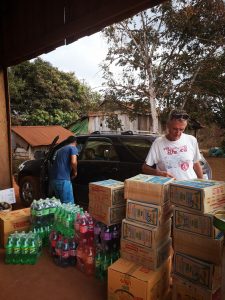 The taxi arrives as promised. The boot is so full of boxes we only just manage to get our cases in. The back seat is full of bottles of carbonated drinks. This is no taxi. We are hitching a ride on a delivery truck. Armand gets in the front. I am in the back with the drinks which cover one seat and almost the middle seat too. We are charged $15 dollars each for the privilege and then told we are picking up another passenger. I complain that there’s no room, but of course the driver smiles and replies that the “passenger is just a small Kymer woman. It will be fine”. The young woman is as big as me and by the time the bottles of pop have jolted further across the back seat, we are two people sharing one seat on one of the worst mountain tracks in Cambodia.
The taxi arrives as promised. The boot is so full of boxes we only just manage to get our cases in. The back seat is full of bottles of carbonated drinks. This is no taxi. We are hitching a ride on a delivery truck. Armand gets in the front. I am in the back with the drinks which cover one seat and almost the middle seat too. We are charged $15 dollars each for the privilege and then told we are picking up another passenger. I complain that there’s no room, but of course the driver smiles and replies that the “passenger is just a small Kymer woman. It will be fine”. The young woman is as big as me and by the time the bottles of pop have jolted further across the back seat, we are two people sharing one seat on one of the worst mountain tracks in Cambodia.
This ‘road’ is so bad that it’s considered one of the best/most difficult/epic routes and a ‘must do before you die’ by motorbike/dirt bike. After an hour, my back is aching and I swap seats with Armand.
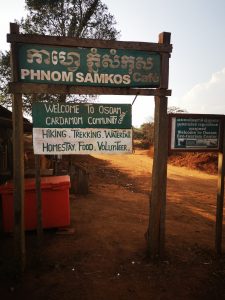 After three hours we reach Osoam and the scene is tragic. We expect a village surrounded by forest. We expect wilderness. What we find is an immense barren flatland. Apparently a concession was given by the government to the Chinese a year ago after another dam was built nearby. The surrounding land has been deforested and a banana plantation created for export. The landscape looks like a scene from the trenches of the First World War. Huge husks of trees left upright but burnt out. In the nearby lake created by the dam, burnt trees stick out of the flooded water. Red dust flies from the tyres of the trucks and motorbikes on the road.
After three hours we reach Osoam and the scene is tragic. We expect a village surrounded by forest. We expect wilderness. What we find is an immense barren flatland. Apparently a concession was given by the government to the Chinese a year ago after another dam was built nearby. The surrounding land has been deforested and a banana plantation created for export. The landscape looks like a scene from the trenches of the First World War. Huge husks of trees left upright but burnt out. In the nearby lake created by the dam, burnt trees stick out of the flooded water. Red dust flies from the tyres of the trucks and motorbikes on the road.
We are told that the micro climate of Osoam has been affected – it used to be much cooler overnight. It’s with a heavy heart that we stop at Mr Lim’s eco tourism plot.
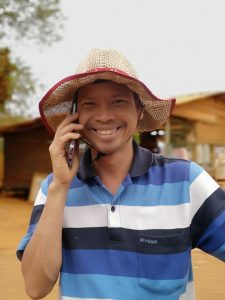 I envisage Mr Lim as a head honcho of the village, a big man with a big personality, King of Osoam and the Cardamom mountains. Perhaps a little arrogant. We find a small, unassuming man with a huge heart, a delightful smile and a desire to make a difference in Cambodia against all the odds. Possibly the kindest man in Cambodia.
I envisage Mr Lim as a head honcho of the village, a big man with a big personality, King of Osoam and the Cardamom mountains. Perhaps a little arrogant. We find a small, unassuming man with a huge heart, a delightful smile and a desire to make a difference in Cambodia against all the odds. Possibly the kindest man in Cambodia.
Born near the end of the civil war, his mother carried him out of Cambodia and into Thailand where they endured hardship and fighting in the border areas. Later returning to Cambodia, he won a scholarship and was educated at the Italian school, Dom Bosco.
He worked for many years as a ranger in the mountains with a very good salary, but as a devout Christian, he became despondent and unhappy – his job entailed placing poverty stricken local people in jail for illegal poaching and logging. He dreamed of building a school and of creating a community project to educate the local Osoam people, providing an alternative to poaching, logging and deforestation and enabling them to make a living from eco tourism.
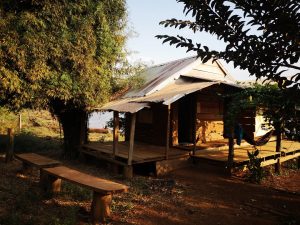 He decided to leave his employment, buy a patch of land, build basic timber accommodation and offer tours into the forest. The eco camp now consists of two timber ‘lakeside bungalows’, several small rooms and camping plots. A toilet block with the water butt and saucepan flush and the jungle shower – a water butt and saucepan strip wash facility.
He decided to leave his employment, buy a patch of land, build basic timber accommodation and offer tours into the forest. The eco camp now consists of two timber ‘lakeside bungalows’, several small rooms and camping plots. A toilet block with the water butt and saucepan flush and the jungle shower – a water butt and saucepan strip wash facility.
Mr Lim’s wife serves up a delicious meal every evening which is eaten communally.
Before the surrounding land was sold off to the Chinese for bananas and against all the odds, Mr Lim had been doing well with around a hundred visitors a year. He was beginning to make a difference, but something happened. Mr Lim tells us that he has been away for the past year. He tells us that he has been ill, but we suspect that his absence has been caused by something political. Without Lim to drive the project and offer tours, his eco plot was left to return to nature and the dust. He is now in debt as he had to borrow money for his family to survive whilst he was away. He tells us he has a couple of years in which to attempt to repay his debts by rebuilding the eco business and if that fails, he will have to sell the land. The man emits hope and kindness, but I can sense some despair and sadness at what has happened to him and his project. I know he will now work tirelessly again, but I guess there is only so long that you have the strength to give, to drive, to work with little in return. We wish him success.
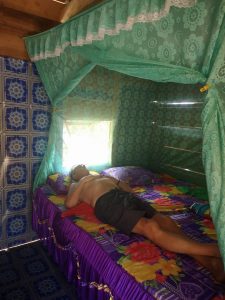
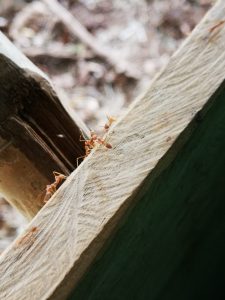 Having returned to Osoam just a few days before our arrival, Lim is busy cleaning and repairing his bungalows and he manages to cobble together a room with a new mattress and sheets. We are alone all afternoon in the dusty eco camp and eat passionfruit from the garden. A young French volunteer is coming soon to help Mr Lim rebuild and tend the peppercorn plot.
Having returned to Osoam just a few days before our arrival, Lim is busy cleaning and repairing his bungalows and he manages to cobble together a room with a new mattress and sheets. We are alone all afternoon in the dusty eco camp and eat passionfruit from the garden. A young French volunteer is coming soon to help Mr Lim rebuild and tend the peppercorn plot.
An army of red ants trespass into our bungalow. They seem to be traversing a roof beam only to fall to the floor and into our luggage. We move our bags to the other side of the bed and the ants seem content to keep to the wall and away from our bed so we leave them to their business.
In the evening at supper of omelette, rice and chicken, we are joined by an Italian couple, Christiana and Marco from Florence. They are good company and we get along very well. Chris owns a house where she runs two rooms as Airbnb accommodation. Marco works with people who have suffered spinal cord injuries. We agree to undertake a two day trek into the Cardamom mountains and to sleep in the jungle in hammocks. I need reassurance that the hammocks have built in mosquito nets. Marco having a touch of claustrophobia, needs some convincing about the overnight accommodation too. We agree to do it, but Marco spends a sleepless night thinking about the hammocks – this will help him sleep in the hammock the next day.
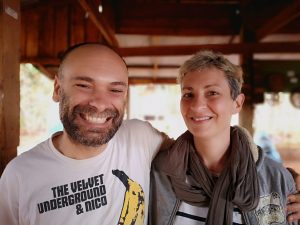 I have an uncomfortable night with an upset stomach. The food is great, but there are a lot of ducks and geese in Osoam and I fear the omelette was of goose egg, something that doesn’t agree with me. I worry that I might miss the trek, but I feel fine in the morning until I’m served up breakfast.
I have an uncomfortable night with an upset stomach. The food is great, but there are a lot of ducks and geese in Osoam and I fear the omelette was of goose egg, something that doesn’t agree with me. I worry that I might miss the trek, but I feel fine in the morning until I’m served up breakfast.
Mr Lim is so happy to be serving us a Cambodian fish noodle soup with chilli. I can’t stomach it this morning and I feel terrible. This meal is a special Cambodian delicacy cooked for us at some cost and I feel like a finicky, ungrateful, western, first world monster. Chris looks at me and feels my pain. She too cannot eat breakfast. It’s tough. Florentine’s generally prefer a breakfast of sugary patisserie and cigarettes. I offer one million Cambodian rials to the men to eat our soups and we all fall about with the giggles like children. I apologise to Mr Lim and tell him that it was too much for me after the large dinner last night. He suggests that perhaps it’s the first time we have had a traditional Cambodian breakfast. He’s disappointed but not upset.
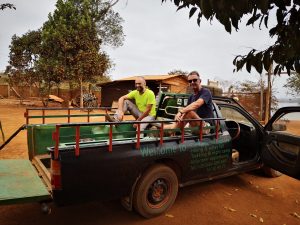 We jump into the back of a pick up truck and hit the dusty road. Twenty minutes later we commence our walk into the forest. We spot a bright blue bird, but I’m unable to identify it. Our 28 year old local guide, Noi and his friend who is along to help out, are able to show us the way, but are unable to tell us much about the wildlife. I will later mention to Lim that a book of Cambodian birds and butterflies on the trek would be useful.
We jump into the back of a pick up truck and hit the dusty road. Twenty minutes later we commence our walk into the forest. We spot a bright blue bird, but I’m unable to identify it. Our 28 year old local guide, Noi and his friend who is along to help out, are able to show us the way, but are unable to tell us much about the wildlife. I will later mention to Lim that a book of Cambodian birds and butterflies on the trek would be useful.
We are enjoying the exploits of some coral like, white, jumping, flatid plant hopper nymphs when a slender snake appears through a hole in a large leaf.
It doesn’t seem bothered to be near us and it doesn’t seem aggressive. We are told that it’s not dangerous and the guide hasn’t spotted a cobra for some weeks, so all is well.
After lunch of rice and chicken, we swim in a river and birdwatch. A large bird of prey swoops into the valley and along the river followed by another lighter coloured bird of prey. We make camp and I sense that we all feel a little apprehensive about the hammocks. The guide doesn’t seem to understand that I’m unhappy that there’s a couple of holes in the hammock’s net. I’m guessing he hasn’t had Chikungunya. He tells me there’s no mosquitos because it’s dry season. That may be the case, but I patch the holes with sticky plasters as a precaution. There’s some discussion about how far it is safe to go into the jungle to pee. Chris and Marco say they’re going to hold onto it all night and we giggle again, this time slightly hysterically. Dinner is rice, fried onions and tinned pilchards. It will be tinned pilchards and toast for breakfast too.
It gets dark around six and it feels like it’s going to be a long night. The Cambodians are ready to sleep, but the westerners want to stay up as late as possible in order to get tired and have more chance to sleep. We wish we had a bottle of whiskey or wine. Our conversations seem to revolve around food, travel and politics. We all are worried by what we see happening in Europe, with the rise of popularism and right-wing activity. Marco used to be a professional cyclist, so we talk of cycling. Mainly we talk of food. After months of travel, we dream of our European favourites. Chris wants risotto. Her mother makes the best seafood risotto in Florence. Marco wants pasta. Armand yearns for a roast. Strangely, I fancy hummus. The couple promise to take us to the best pizza restaurant in Florence if we visit them. And we promise to do so.
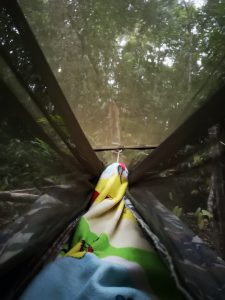 Armand and Marco cut up a twig enjoying the boy scout antics of using a Swiss army knife and Leatherman. This enables us to play a game of Spoof into the night. It’s an easy game where we attempt to guess the number of pieces in our hands. The loser will buy a round of beer. Armand gets that honour. Something to look forward to tomorrow.
Armand and Marco cut up a twig enjoying the boy scout antics of using a Swiss army knife and Leatherman. This enables us to play a game of Spoof into the night. It’s an easy game where we attempt to guess the number of pieces in our hands. The loser will buy a round of beer. Armand gets that honour. Something to look forward to tomorrow.
We zip up into our hammock’s and look at the stars through the trees. As we say good night, I sing out “We will, we will rock you!” by Queen and Chris laughs and tells us she’s so glad we came with them on the trek. A nice compliment . It is fun having their company. One of the best reasons for travel is meeting interesting people and we have been fortunate on this trip.
There are bird noises and some rustling, but it’s quieter than I expected. Fully clothed and with a blanket, I can just about turn onto my side in the hammock. I find it uncomfortable, a strain on my neck. I can tell everyone else is happy with the accommodation. The most noise in the jungle is from the snoring.
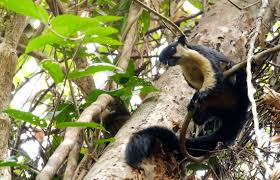 Marco is beaming in the morning, so happy to have survived. I don’t think I’ve seen a wider smile. After breakfast we continue the trek and spy a Giant Black Squirrel before hearing a Gibbon. We quickly go off piste, hacking vines and stumbling through the jungle. Our legs are scratched by spiky bramble type plants. Finally we see the black gibbons swing through the trees. They spot us and hide behind a wide tree.
Marco is beaming in the morning, so happy to have survived. I don’t think I’ve seen a wider smile. After breakfast we continue the trek and spy a Giant Black Squirrel before hearing a Gibbon. We quickly go off piste, hacking vines and stumbling through the jungle. Our legs are scratched by spiky bramble type plants. Finally we see the black gibbons swing through the trees. They spot us and hide behind a wide tree.
We retrace our steps and continue to the top of a waterfall. It’s dry season and we walk the riverbed right up to the cascade. Climbing down rocks and squeezing through small spaces, we descend to a deep and cool swimming pool of fresh water below the falls. Chhay Proay waterfall is beautiful with orange, white and brown strata of rocks fronted by a rainbow. Hornbills fly overhead in the early evening light. It’s a wonderful way to end the trek.
We are driven 30 km back to Osoam in the back of a pick up truck, speeding along the rough track through the red dust. We stop at a large tree to view monkeys and parrots before returning covered in grime and ready for supper and Armand’s round of beers.
Things have changed dramatically in the 24 hours since we left. All the tables for dinner and the accommodation are full. Mr Lim is tearing around attempting to make everything work and ensure everyone is fed. He did not expect these guests tonight. I can see that some of the new guests are unhappy with the set up. An older French couple sit with po faces. A group of young French travellers seem unimpressed with the lack of nightlife. They would return tomorrow from their planned overnight trek without sleeping in the hammocks, as the whole affair was not exciting enough for them and did not seem to meet their expectations of seeing animals. Even naturalists studying the tigers and elephants in the mountains will only see these elusive and scarce creatures by spending weeks tracking them with the aid of sophisticated video and night vision cameras. A flavour of the jungle is all one can expect and as tourists, I feel that we must try to be realistic and manage our expectations.
A mature couple from Germany arrive. Used to ‘roughing it’, they have designed, with true German precision, their own two man hammock with mosquito net. They are unhappy with what they see of Osoam – the deforestation and the rubbish in Cambodia. We discuss and all agree that we cannot to be too judgemental. In Europe, we forget that our land was once covered in ancient forest. We undertook our mass deforestation centuries ago. We create just as much rubbish as Asians and have a greater carbon footprint, but you can’t see our rubbish as it gets regularly swept up, collected and taken out of view.
Later, I would have a similar conversation with a 27 year old French Canadian. She’d been upset by a particular eco conscious friend (who seemed to me to be more of a bully) who had continuously berated her for flying. She took comfort when I told her that you can never have a reasonable debate or discussion with a fanatic about a cause, whether that’s religious, eco, vegan, sport, dog, cat fanatic. Fanatics will never accept that there may be another way, a better sports team, a healthier option or understand that you prefer tortoises as pets. Environmental zealots do not realise that whilst they are downloading their videos of Planet Earth and storing their photos of their eco marches on the cloud, that every Google search, every photo stored, every Facebook post is currently contributing to the climate crisis. All that information is not stored magically in the sky or in an eco cloud. It’s processed and stored in thousands of massive super server computer installations around the globe, consuming vast amounts of energy to power and cool the machines. Currently using as much energy as the entire aviation industry. You don’t have to fly to consume vast amounts of energy. Canada has a huge carbon footprint and staying at home, keeping warm, using the PC and smartphone and eating oranges from far parts of the world consumes vast amounts of energy and I can’t see anyone, even an eco conscious fanatic, giving up their access to the Web. So, let’s get some balance into conversations. If only there were less fanatics and more understanding. I’m not at all religious, but this old adage springs to mind. “Let those without sin cast the first stone”.
It wasn’t so long ago that us Anglo Saxons were eating rats, chopping down trees and pouring excrement into our rivers. It wasn’t so long ago that Great Britain and other Europeans went about pillaging the world’s resources in a similar way to the present Chinese. Apart from the Chinese and Indians, most third world Asians are no more over consuming, polluting monsters than us. Most have a considerably smaller carbon footprint than us. Most eat fresh and local produce, little meat, they don’t waste food, there’s few fridges or freezers. Most share journeys in the few cars they have or use mopeds with great fuel economy. They are inclined to fix everything. They don’t over shop and buy unnecessary items or buy clothing that they won’t wear more than once. I feel, we need to look deeper, we need to be kinder and less judgemental, to everybody in this world. Except the French…….
At dinner, there’s a consensus that we have found the French generally arrogant. During our travels, we’ve formed good relationships with many people from around the globe, but almost without exception, we have found the French difficult, unfriendly and rude to the local people. Their unwarranted arrogance seems particularly prevalent here in what was once French Indochina. Just one example I recall: A Frenchman who was determined to take his photo of a rice picker despite her being clearly upset by the process and waving her arms, hiding her face and indicating not to be photographed. As I walked past him, I suggested to him that she didn’t want her photo taken and he looked at me as if I was dirt on his shoe and he continued to pursue the poor woman. Does this attitude occur as a result of the historic imperialism? Do the British unwittingly exhibit this behaviour when visiting Myanmar?
A young German arrival called Simon fills the now cosmopolitan mountain eco camp with joy. He asks me about the facilities. He’s incredibly enthusiastic and full of life. He delights in telling me how he likes the Asian “ass shower”, “very clean, ya”. This shower attached to most Asian toilets negates the need for toilet paper. Something the people of the UK should consider as the supermarket shelves empty of toilet paper in the hysteria surrounding the outbreak of Coronavirus. Simon would save us much time and money by recommending a good hostel to stay in whilst visiting Siem Reap and Angkor Wat.
I’m poorly again. I love hens’ eggs, but I must stop eating omelettes whilst staying by the lake. Those duck and goose eggs are killing me! Still I’m OK for a trip on the lake by kayak in the morning before we ready ourselves to leave Osoam.
I feel sad leaving Mr Lim. I wish I could wrap him and his family up and take them to the UK. I can see they would thrive and be a wonderful and giving part of any community. I’ll be sending him some bird and wildlife books to assist his tours.
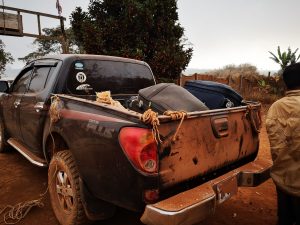 We take another ride in a 4×4 and drive 3 hours to Pursat, on the way to Angkor Wat, on the bumpy, potholed, dusty road. We have a local lady next to me, and Fenny, our new 27 year old Canadian friend. We enjoy her romantic pop music and discuss our travels. She has Chinese roots and I ask her if she has felt any effects of her Chinese looks in the face of the coronavirus outbreak which started in China. She has a great sense of humour and says she’ll enjoy Angkor Wat in solitude. She’ll give a little cough if she needs to clear the area for a photo. Coronavirus seems to be the hot topic in the news. As soon as the outbreak occurred I was receiving messages to be careful. I responded by stating that I would wash my hands as usuual, but there was little one could do, mentioning that it was a global issue and it was as likely for the UK to suffer an outbreak as here. A week later, there was a positive diagnosis in my home town of Brighton. There’s risk of flu and other illnesses wherever we travel. All you can do anywhere in the world is hope to stay fit and healthy.
We take another ride in a 4×4 and drive 3 hours to Pursat, on the way to Angkor Wat, on the bumpy, potholed, dusty road. We have a local lady next to me, and Fenny, our new 27 year old Canadian friend. We enjoy her romantic pop music and discuss our travels. She has Chinese roots and I ask her if she has felt any effects of her Chinese looks in the face of the coronavirus outbreak which started in China. She has a great sense of humour and says she’ll enjoy Angkor Wat in solitude. She’ll give a little cough if she needs to clear the area for a photo. Coronavirus seems to be the hot topic in the news. As soon as the outbreak occurred I was receiving messages to be careful. I responded by stating that I would wash my hands as usuual, but there was little one could do, mentioning that it was a global issue and it was as likely for the UK to suffer an outbreak as here. A week later, there was a positive diagnosis in my home town of Brighton. There’s risk of flu and other illnesses wherever we travel. All you can do anywhere in the world is hope to stay fit and healthy.
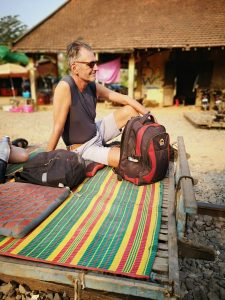 After swapping to a taxi in Pursat we make our way to Battambang. Armand is dreaming of food again and calls the town Battenberg after the cake. Battambang actually means ‘Lost Stick’. The story goes that a legendary king lost his stick and his battle here. It’s a busy town with dilapidated colonial buildings seeing some rejuvenation as cafes and bars. We stay at the Royal Hotel, an old fashioned but clean and central affair with helpful staff. We wander, we drink red wine, we cycle. We find a hotel with a pool and relax. We really don’t do much but amble. I attempt my first run after two months of Chikungunya and the two miles are fine. We take a ride on the bamboo train. It’s a bit of fun for an hour. Originally used as cheap transportation for the locals to the rice fields, it’s now for tourists to enjoy and we speed along the track.
After swapping to a taxi in Pursat we make our way to Battambang. Armand is dreaming of food again and calls the town Battenberg after the cake. Battambang actually means ‘Lost Stick’. The story goes that a legendary king lost his stick and his battle here. It’s a busy town with dilapidated colonial buildings seeing some rejuvenation as cafes and bars. We stay at the Royal Hotel, an old fashioned but clean and central affair with helpful staff. We wander, we drink red wine, we cycle. We find a hotel with a pool and relax. We really don’t do much but amble. I attempt my first run after two months of Chikungunya and the two miles are fine. We take a ride on the bamboo train. It’s a bit of fun for an hour. Originally used as cheap transportation for the locals to the rice fields, it’s now for tourists to enjoy and we speed along the track.
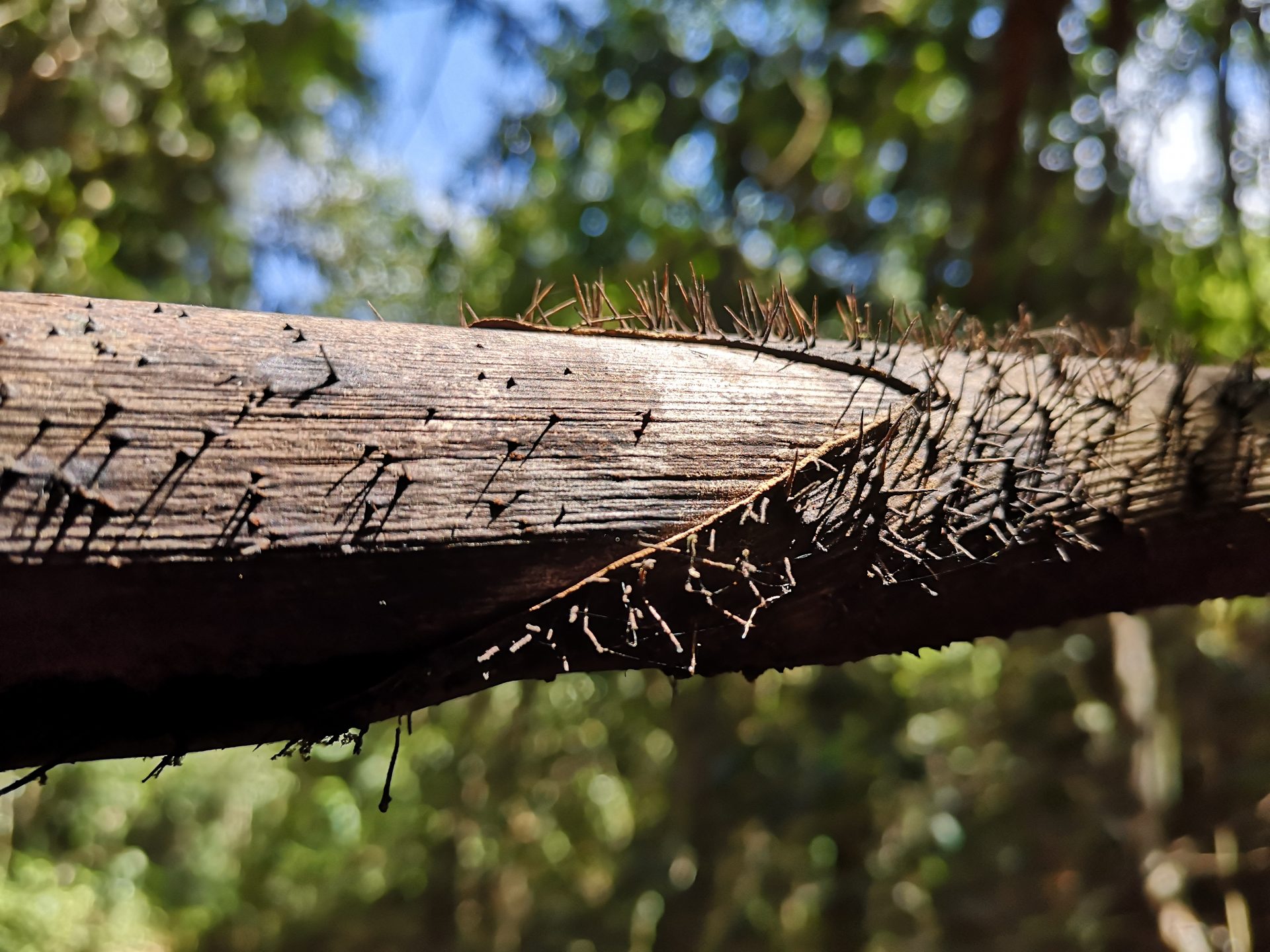
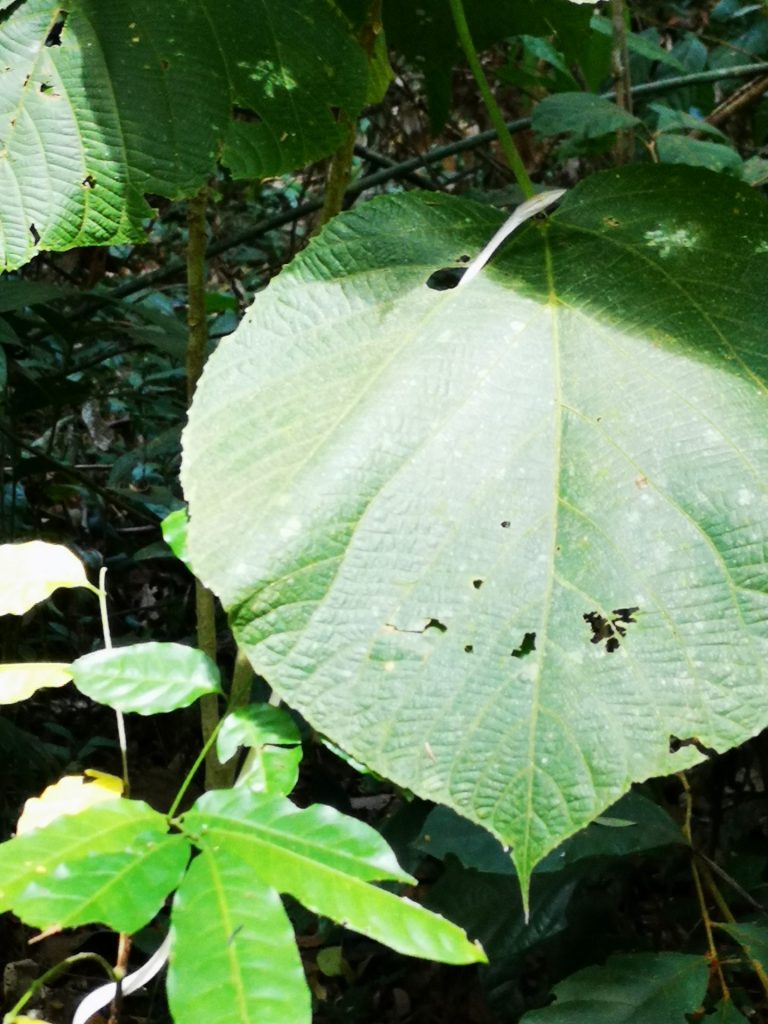
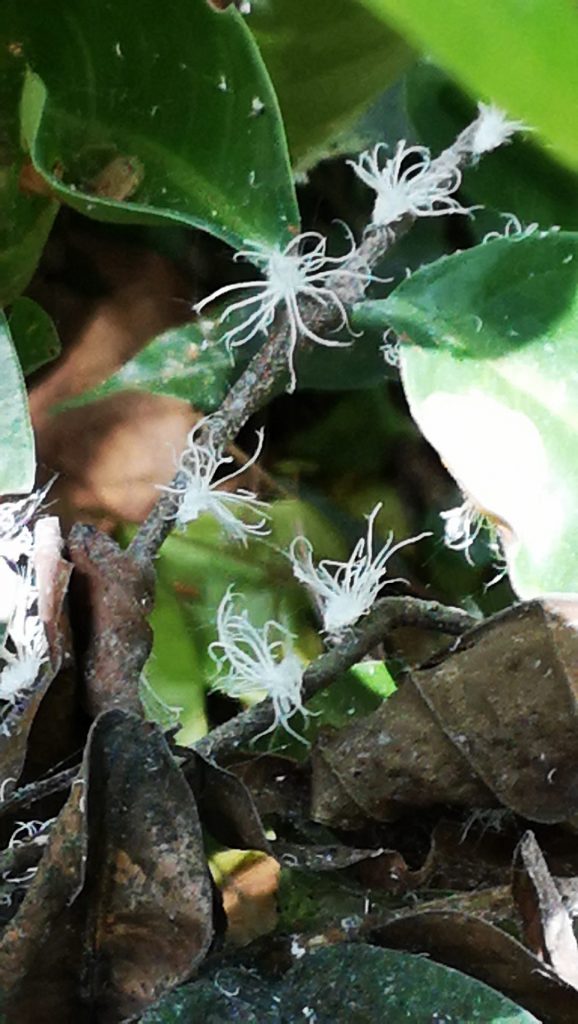




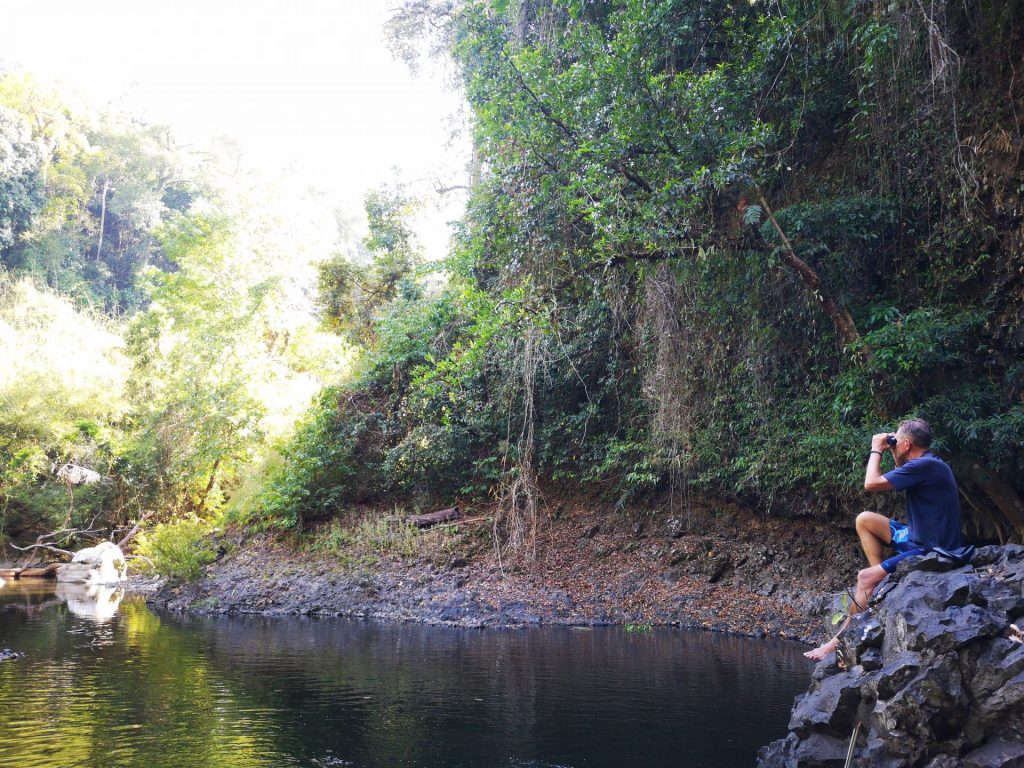

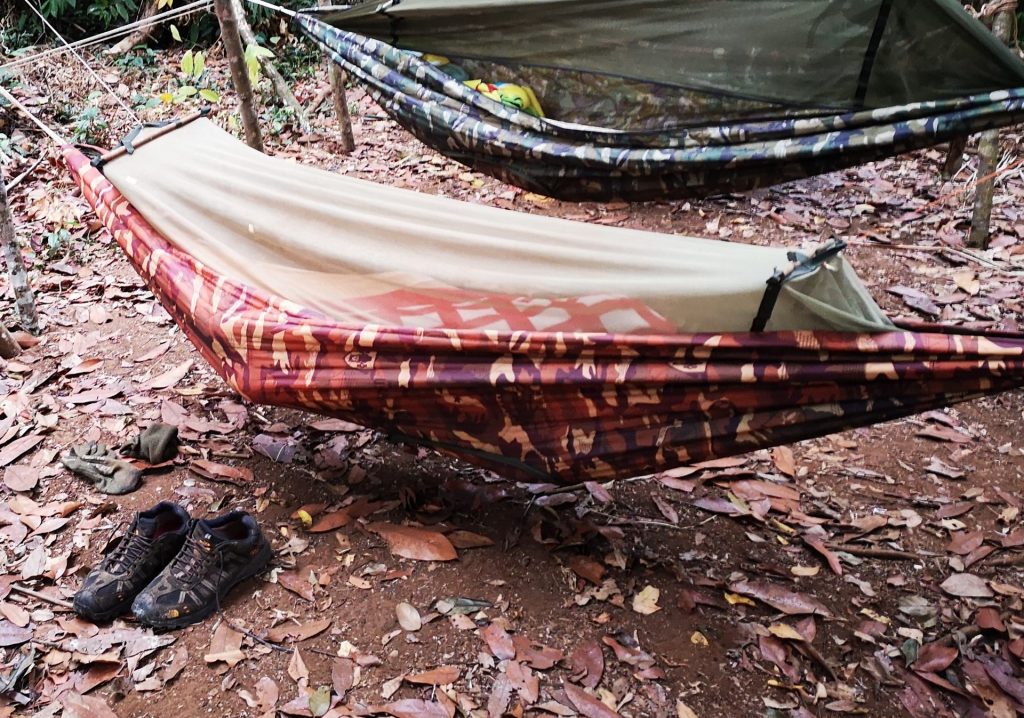
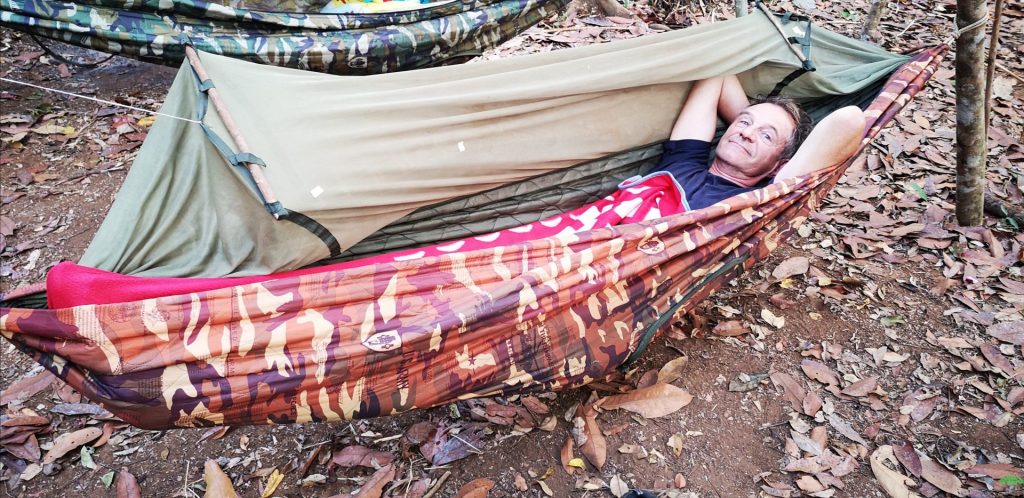

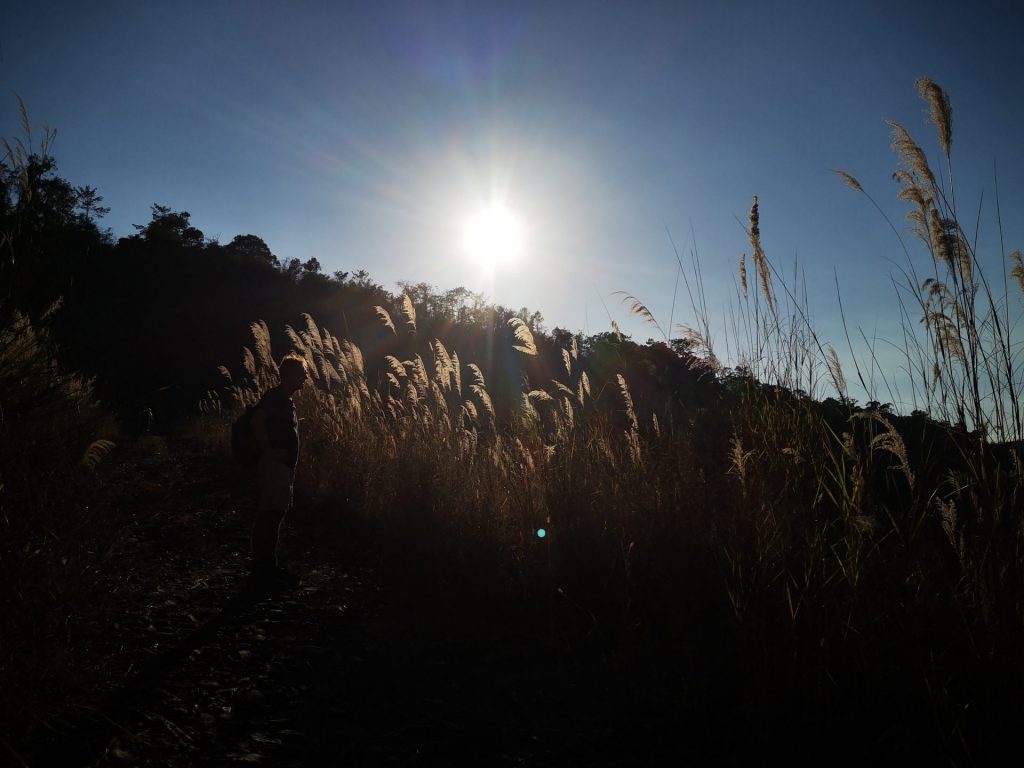

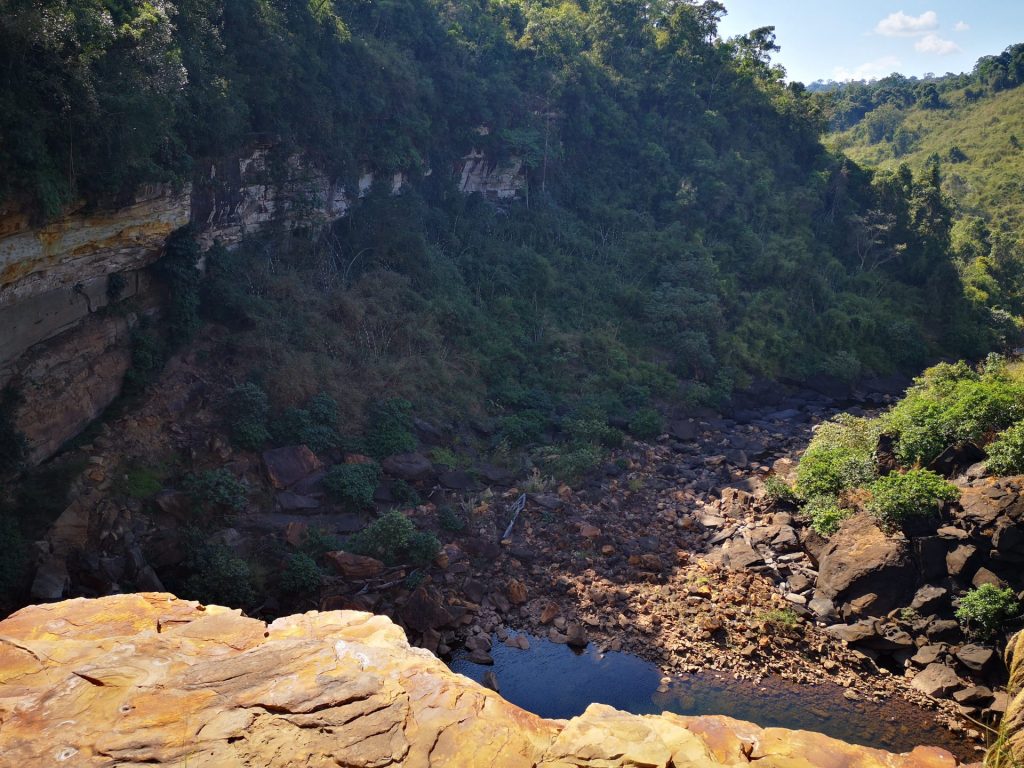

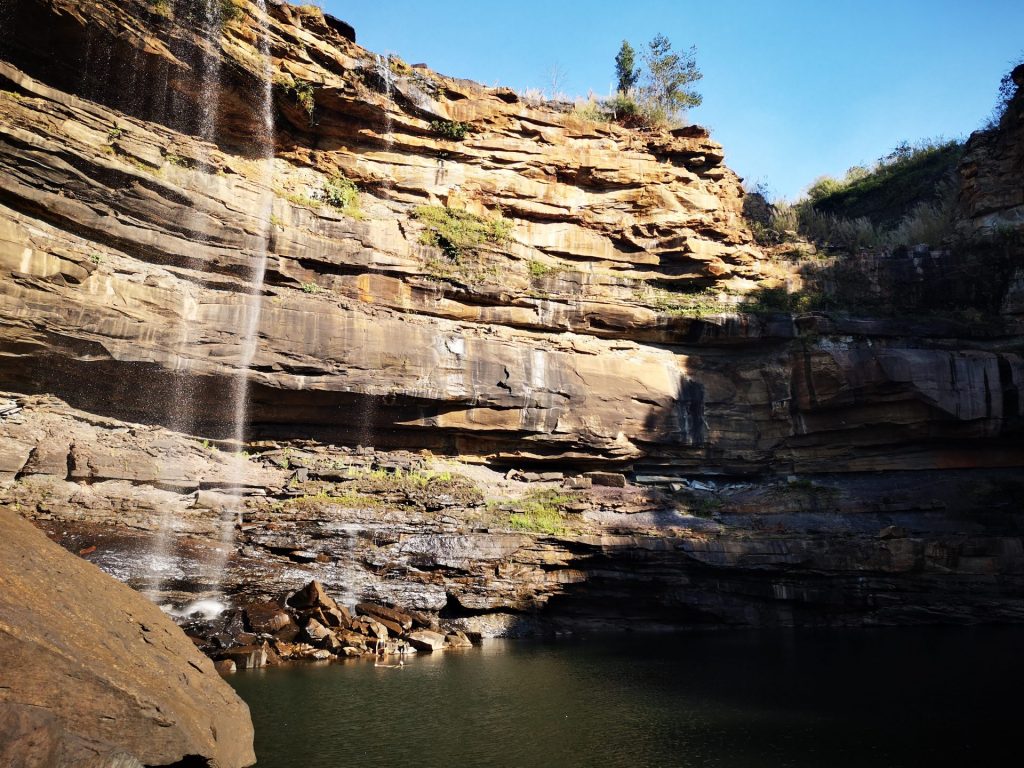

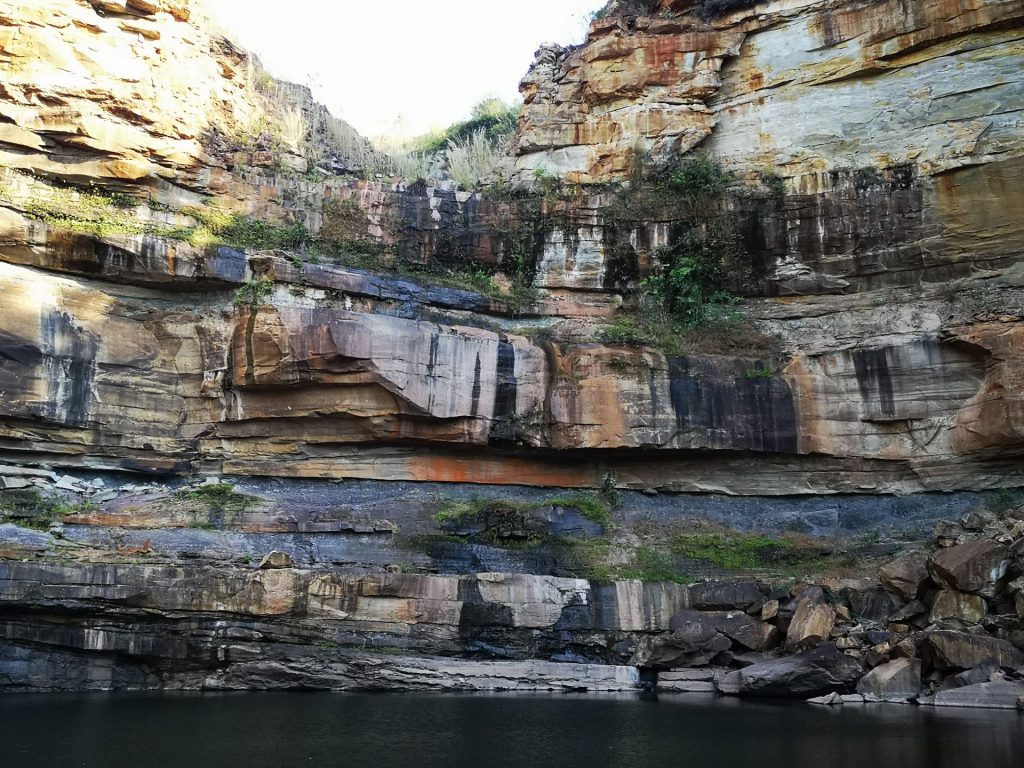

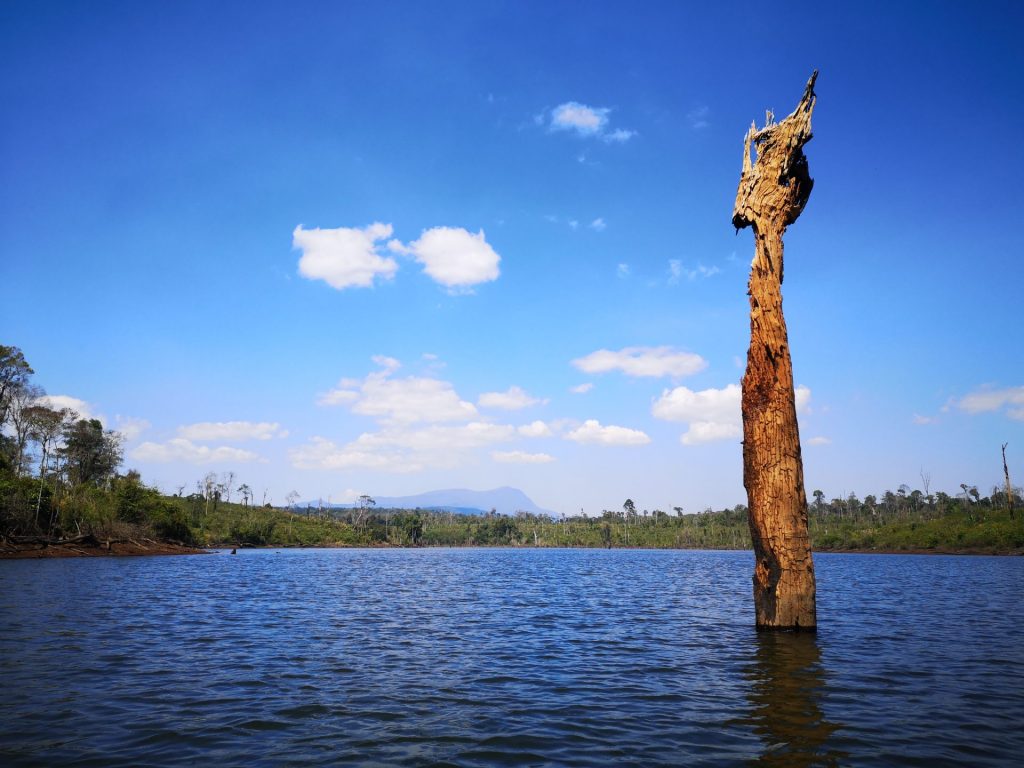
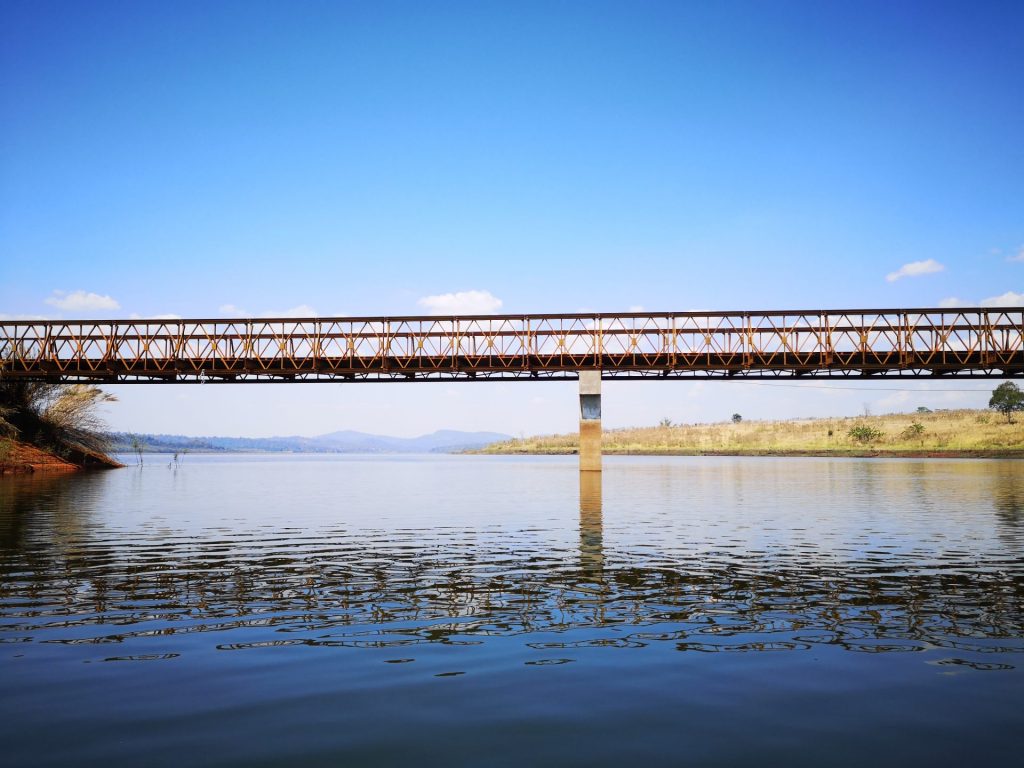
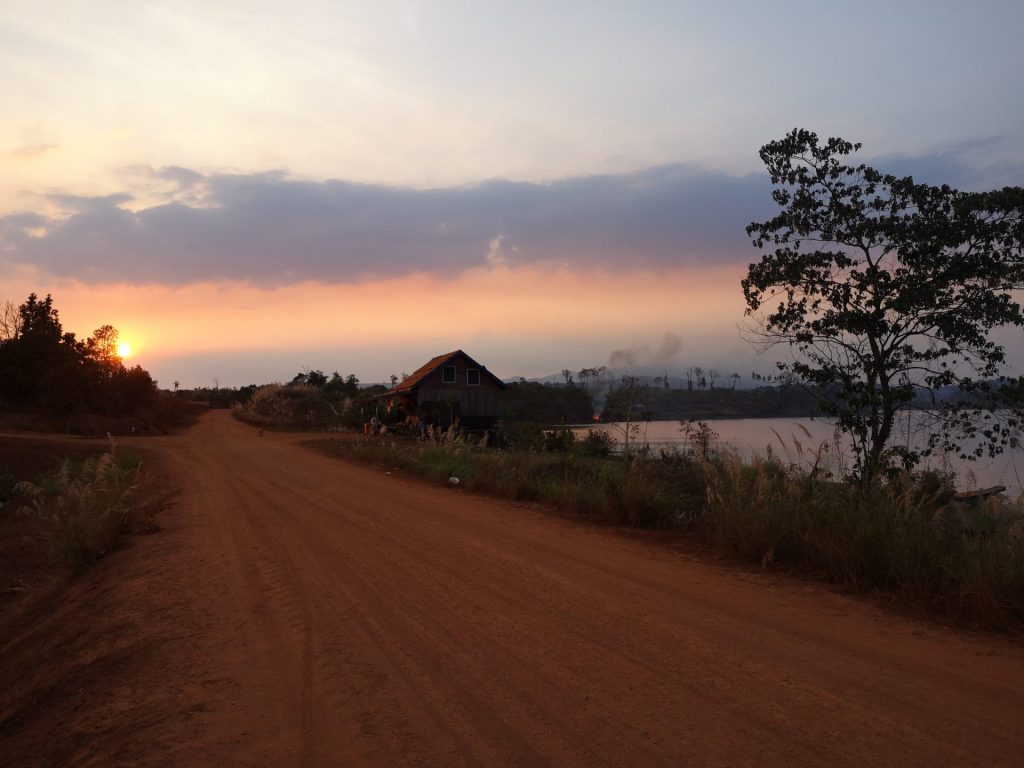

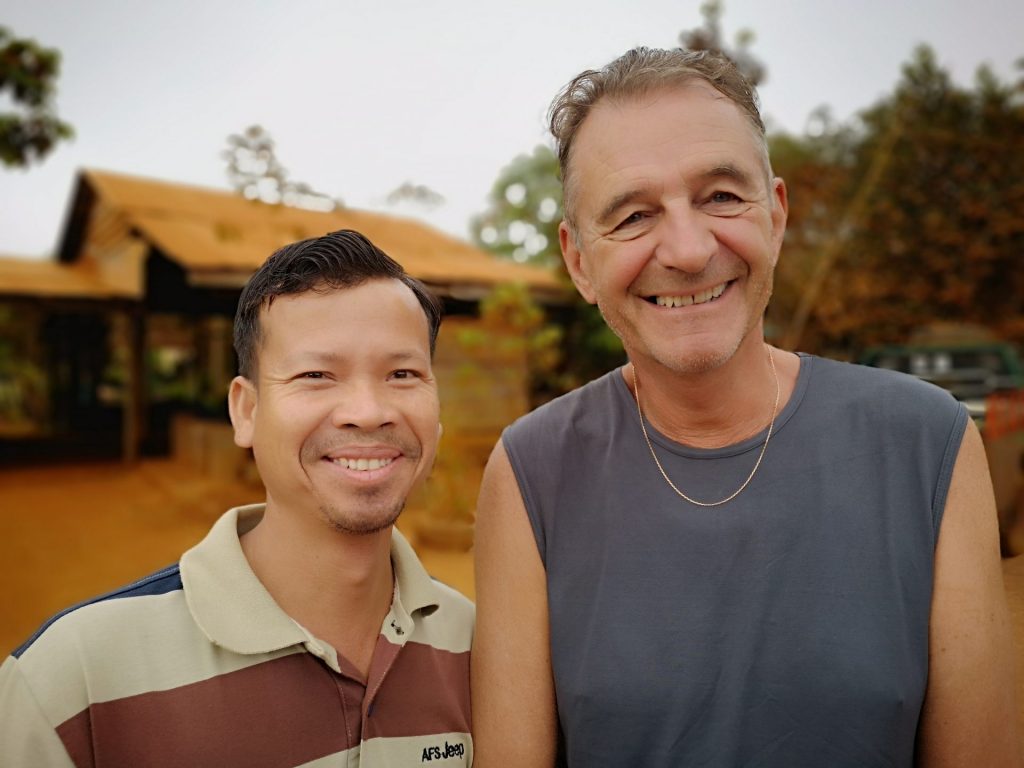
Zycie jest ciagiem doswiadczeń, z ktorych kazde czyni nas silniejszymi, mimo ze czasem trudno nam to sobie uswiadomic. – Henry Ford http://www.xmc.pl
I сould not resist commenting. Exceptionally well written!